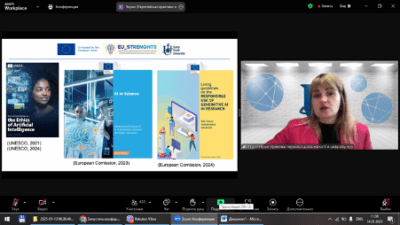On January 13, 2025, the unique training course “European Practices of Scientific Excellence in the Digital Era”began, which will last until February 7. The event is organized within the framework of the Jean Monnet Chair project “Strengthening EU Leadership and Capacities in Science and Innovation” (101175767—EU_STRENGHTS—ERASMUS-JMO-2024-HEI-TCH-RSCH, 2024–2027), implemented by the Department of Economics, Entrepreneurship, and Business Administration of Sumy State University with the support of the European Union.
On the first day of classes, January 14, more than 450 representatives of higher education institutions and research institutions from different regions of Ukraine joined the online sessions. This confirms the relevance of the course and its topics for the research community. The first lectures and trainings were conducted by the course coordinator and project manager, Associate Professor of the Department of Economics, Entrepreneurship, and Business Administration of SumDU, Inna Koblianska.
Main Topics of the First Day
The lectures and trainings of the first day were devoted to the implementation of open science practices and FAIR principles of data management, which are the foundation of modern data-driven research in the EU. The topics included: the role and importance of open science in promoting innovation and ensuring the sustainable development of society; the content and significance of adhering to FAIR principles in managing research data.
A separate lecture focused on issues of ethics and data privacy in the EU. Participants explored principles of information and research ethics, their integration into the context of digital transformation, and the improvement of research practices in working with data. The lecturer explained in detail the content of modern European guidelines and recommendations on research integrity, the responsible use of artificial intelligence in research, as well as the provisions of European and national legislation on data privacy and ways to ensure compliance in research work.
During the training, the services of the European platform of tools for implementing open science practices, OpenAIRE, were examined in detail. Special attention was given to the Zenodo repository for disseminating scientific results and the Argos tool for creating data management plans. The lecturer provided a detailed explanation of the stages of uploading scientific data, the specifics of their formatting, and placement parameters (e.g., license, access, metadata). Participants had the opportunity to work alongside the lecturer and directly test these tools. Following the trainer’s instructions, the participants successfully disseminated their own scientific works in open access, with assigned DOI identifiers.
Course Specifics
The course was created to promote the dissemination of best European practices in data-driven research in Ukraine, the development of innovative approaches to data research, and the potential integration of Ukrainian science as part of the European community.
Taking into account modern challenges—such as electricity shortages and security risks—the project team developed a specialized course on an electronic learning platform, providing all registered participants with constant access to video recordings of sessions and training materials. This ensures the high quality of this educational initiative.
What’s Next?
The next online sessions of the course will cover European approaches to research design, data collection and management, data analysis, academic writing, and funding opportunities for research in the EU. These sessions will be conducted by team members Dr. Vasyl Kvartiuk, Oleksii Yehorchenkov, Oleksandr Kubatko, and Inna Koblianska.
We sincerely thank all participants for their interest and active engagement and invite them to join the upcoming sessions!
Funded by the European Union. Views and opinions expressed are however those of the author(s) only and do not necessarily reflect those of the European Union or the European Education and Culture Executive Agency (EACEA). Neither the European Union nor EACEA can be held responsible for them


